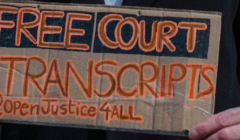
Why Open Justice For All is seeking change for victims
Campaigner Charlotte Schreurs explains why the creative industry is coming together to lobby for change for victims.

Leaders from brands, agencies and Extinction Rebellion explain why the climate crisis demands a step change in approach from the industry.

In an era in which attention is often only ever partial, puncturing the collective consumer inertia with a complex message is no easy feat. Yet it is a challenge which Extinction Rebellion have risen to.
The peaceful mass protests orchestrated by Extinction Rebellion have been nothing short of transformational, catapulting the crisis to the top of the media agenda. While a firm line from business leaders including former Unilever CEO Paul Polman and the governor of the Bank of England Mark Carney has underlined the responsibility of business to make tangible changes.
The scale of the climate crisis might make it easy for brands and businesses to believe themselves inept at making an impact. Yet according to the Carbon Majors Report only 100 companies are responsible for 71% of the world’s carbon emissions.
Polman issued a stark warning in The Guardian that “we are about to commit the biggest intergenerational crime in the history of mankind”. Noting that if business fails to address issues of inequality and climate change, a lot more people are going to be dissatisfied, feel not included or left behind. A state of play which means, according to Polman, business leaders must step up and move outside of their comfort zone to take personal risks.
Finding this willpower isn’t always easy. For the advertising industry, reaching the tipping point when it comes to acting on the climate emergency often comes second place to the urgency of hitting the next quarter’s targets. Yet there are signs that overlooking the important in pursuit of the urgent is no longer a long-term business strategy.
Business leaders must increasingly look beyond short-term profitability to address the pressing need to reduce emissions. For an industry based upon the success of its people, the increasing propensity of those people to speak out, boycott and opt-out of working for brands which don’t reflect their own personal values means that maintaining the status quo is no longer an option for ad agencies seeking to build a creative competitive advantage.
With this in mind we asked a selection of industry leaders to have their say on how the industry can address the climate crisis:
You don’t have to be on the wrong side of history. This is an industry capable of quickly shifting global public opinion and behaviour.
William Skeaping, Extinction Rebellion

Forget 11 years to save the planet; the latest science suggests we have less than 100 months. Meanwhile advertising continues to drive the high carbon lifestyles and hyper-consumption that is killing us. “Never was so much destroyed by so few for so little. Never did so much need saving by so many so fast.”
You don’t have to be on the wrong side of history. This is an industry capable of quickly shifting global public opinion and behaviour. You have an opportunity to lead where governments have failed; to use your skills to share a new message.
Tell the truth about the climate & ecological emergency, across campaigns on billboards and on screens. Speak to your brands; let them know their coveted Gen Z audiences will be gone if they don’t act now. Help us vision this urgent change as a positive opportunity!
Collaborate as an industry: refuse to work for toxic brands; drop them together. Support climate strikes. Send staff on secondment to Extinction Rebellion and join them on the streets in October. Demand that tall US CEO who just flew in takes this deadly seriously.
Front-load spectacularly, if not for the planet and the billions in the global South currently fighting for survival, then do it for yourself because there won’t be any pop-up street food, holibobs or human rights when the crops fail.
Twitter: @ExtinctionR @XRebellionUK @Skeapspeaks
Staff secondment enquiries: [email protected]
Imagine if that billion-dollar persuasion machine was promoting quality of life rather than quantity of stuff.
John Sauven, Greenpeace UK

The advertising industry’s responsibility for what they promote, both good and bad, is an endlessly fascinating question. But in a time of climate emergency, more important than assigning credit and blame is looking at opportunities for change. We have the technical solutions, but the political will is lacking, and weak-willed politicians blame a fickle public whose commitment to decarbonisation may not survive a bit of real-world inconvenience.
But we have the technology to change that too. The ad industry has a budget of around $700bn a year, mainly to spend on promoting unsustainable consumption. Imagine if that billion-dollar persuasion machine was promoting quality of life rather than quantity of stuff.
How could companies like McDonalds use its marketing spend to promote a plant-based diet rather than a meat-based diet? And when it comes to greenwash, could the ad industry refuse to participate in the dirty business of selling the oil industry? BP spends most of its capital expenditure on hunting for more oil and gas. It spends most of its marketing budget promoting its ‘green’ credentials. If everybody withdrew their support, as artists, performers and some advertising agencies have done, they would eventually be forced to match their green advertising slogans with real green investment.

Should we all be doing more to tackle climate change? Yes of course. So why would the advertising industry be any different? The key question, for us as individuals, companies, governments, international organisations, is what can we best do? What are our obligations and opportunities? Framed this way, the questions for the advertising industry become what are our obligations to tackle climate change i.e. how might we have contributed to climate change and how do we stop doing so, and what are our opportunities i.e. where can we make a positive contribution to the issue?
What can we stop doing? Taking work from clients who aren’t actively reducing their own contributions to climate change; earning money from high carbon clients, the sort of companies from whom the investment community is increasingly divesting; promoting unnecessary and over-consumption.
What can we start doing? Use our two unique platforms of influence to promote positive action. We are, or should be, trusted advisors to business. We should be the ones advising them that climate change is an existential threat to their business and that we can help them find new ways to make their business sustainable in the new reality. And we could also aspire to be the trusted guardians of people. We have our hands on the levers of behaviour change. We spend every day thinking of ways to change people’s behaviours, to prefer that washing powder, to shop in this store, to drive that car. These skills are the ones needed more than ever by the world to halt the human causes of climate change.
Morally neutral is no longer acceptable, to the talent who want to work with us, the businesses who need our best advice and the regulators who govern us. So yes, it’s in the advertising industry’s interests to be doing more to tackle climate change.
We have our hands on the levers of behaviour change.
Andy Last, MullenLowe salt

Like every single person who calls Earth home, we have to do our part. But unlike everyone else on this planet, every one of us in the advertising industry is in the privileged position whereby our actions can have a disproportionate impact.
At our best, what we do has the power to change hearts, minds and behaviour resulting in action, potentially on a global scale and also with profound and rapid effect. But at our worst, we also have the power to reinforce behaviours that damage our planet or to see the climate emergency as a great opportunity to create a vanity project that makes us feel good; scam work that assuages the conscience and fills the trophy cabinet but has no impact in the real world.
Let’s believe that our intentions are good, and imagine for one moment that we all, collectively, are starting using our powers for good. Turning down pitches that encourage behaviours that denigrate the planet we call home; working with our clients to promote more sustainable and ethical ways of living, consuming and moving; and dedicating more of our passion projects to collaborating with businesses who have both the knowledge and the capabilities to make a tangible and positive difference to the future of our planet.
Ultimately, as an industry, it’s time to stop the talk and get on with action.

Short answer, yes. The industry is full of highly intelligent people, and when everyone comes together, there can be a lot of progress in a short amount of time. Just look how quickly we’ve incorporated diversity in the field since it was identified as an issue. It’s an opportunity and a challenge, but advertisers are experts at effecting change, and if we utilize all of the incredible talent, there can be a huge impact.
I have a lot of friends in the industry who are increasingly frustrated about the work they’re doing, and while this may be blunt, they are often working on brands where it’s about selling more, often plastic products, versus making a meaningful difference in the world. If you let people work on a project that leaves them feeling satisfied, it’s rather refreshing and can stimulate creativity in other ways. Let’s create a movement and band together to save the planet in a non-branded or political way. I’m sure most advertisers and agencies would rather work on solving this global crisis, and if we can use just 5% of the industry’s time toward this initiative, I believe that would lead to greater satisfaction, retention and more.
Our industry and its people, after all, share the same fate of the planet as everyone else.
Caroline Paris, Brave

Consumerism continues to grow and we, as marketers, have an opportunity to positively influence and spark greater consciousness. Fortunately, there is an awakening happening, with people taking to the streets calling for climate action and asking more questions of businesses. Both brands and agencies have a responsibility to do the right thing and not simply appear to be doing the right thing.
At the end of 2018, we had our climate goal – to be carbon zero – independently validated by the Science Based Target initiative (SBTi). For us, this started with a complex process mapping our carbon footprint from crop to cup. For an advertising agency, a simple swap to renewable energy in their offices would help to significantly minimise their carbon impact across the business.
If you want to engage in being part of solution in the climate emergency, but are unsure where to start, look into becoming a B Corp, a community of like-minded businesses who are determined to use business as a force for good. B Corps benefit from learning best practices from a variety of companies and industries, enabling individual businesses to engage in their purpose and impact more authentically and sustainably.
Lastly, make a statement. We would like to see advertising agencies say they’ll only work with brands who are genuinely committed to tackling climate change. In the long-term it will build your brand equity, making you more desirable to work with as conscious consumerism strengthens.

Last month saw Extinction Rebellion take the Palais by storm during Cannes Lions festival of creativity. The protesters demanded that adland take more steps to help the world avert the climate disaster they believe is just around the corner. With William Skeaping, a former creative strategist at McCann London, a prominent member at the helm, it’s hard to say that adland isn’t concerned about the issue. Our industry and its people, after all, share the same fate of the planet as everyone else.
Yet, it cannot be denied that this moment has sparked renewed impetus for the industry to tackle this issue with bolder, better, and braver initiatives. Twenty agencies are now signed up to #CreativesForClimate movement to stop working on fossil-fuel briefs, with a target of reaching fifty. But it’s important to not forget that many ad agencies have been enacting changes in-house and in their creative for years. Perhaps adland should shout a bit more about the good work it does on sustainability and own the conversation more rather than be led by it.
There are many social and environment issues facing us right now. We cannot and should not wait for governments to solve all of these.
Mark Cuddigan, CEO, Ella's Kitchen

Climate change is something we’re all facing, and it’s something we’re all contributing towards. Although energy firms and transport providers tend to dominate the headlines, every business, including advertising, has an impact on the environment, and therefore has a responsibility to be a force for good.
The truth is that the physical infrastructure that digital marketing relies on, for instance, is a huge source of carbon emissions. But because the emissions are caused off-site, in cloud storage facilities or factories, they go unseen, and therefore there’s a risk they’ll go overlooked. That’s why a business needs to impress the importance of sustainability upon its suppliers, as well as its entire team of workers.
An agency working to minimise its environmental impact should be lauded. But they need to take a look at their clients, too. It’s not enough for an agency to be eco-friendly if it's contributing to the financial success of a client that isn’t trying to combat climate change.

Everyone needs to be doing more about climate change and the ad industry is no exception. However, we recognise the many initiatives our members have already taken within their own operations and value chain and continue to work where appropriate across the advertising industry to advocate the need to go farther, faster.
What if we could harness the collective creative and media firepower of the whole industry, rather than individual agencies on specific campaigns?
John Treacy, Executive Creative Director, Proximity London

Climate change is something that effects everyone; individuals, families, communities and businesses, so we should ALL be doing and demanding more; more transparency from the companies we buy from and work for, more commitment to change, and using our influence for more than just profit.
For me, the most effective way to achieve that is to to live and breathe the B Corp philosophy; putting profit on an equal footing with people and planet and using business as a force for good.
Within the advertising industry there is a unique opportunity to do this by using the influence it has over some of the world’s biggest brands. At Ella’s Kitchen we’ve seen this on a small scale when we challenge our suppliers and partners to measure their business against the Impact Assessment from B Lab, the charity that runs the B Corporation movement.
One of the proudest moments of my life was when our agency Havas London certified as a B Corp. There are many social and environment issues facing us right now. We cannot and should not wait for governments to solve all of these. The advertising industry, like all industries, has a critical role to play in tackling the climate emergency.

Extinction Rebellion recently (and rightly) called out the ad industry in its open letter to agencies by saying, “making a small campaign to give up drinking from plastic straws is not going to cut it. Neither is doing some pro-bono for an anti-palm oil initiative.” Ouch.
But they make a valid point. Agencies have done some of their strongest creative work for environmental issues but have those ideas had a long-term measurable effect beyond the jury rooms of Cannes and D&AD? I think we are starting to see that they are.
Ideas like The People’s Seat, Trash Isles and the Palau Pledge have begun to move the dial on meaningful action. But what if we could harness the collective creative and media firepower of the whole industry, rather than individual agencies on specific campaigns?
For an industry set up to be inherently competitive with each other it’s a big ask. However, when the issue is as big as it gets, surely, we can all leave our egos at the door? The prize is way bigger than anything we might pick up in Cannes.
Mark Cuddigan is speaking at BITE LIVE 2019 alongside Xav Rees, CEO of Havas London, lifting the lid on what it means to be a B Corp certified company.
Looks like you need to create a Creativebrief account to perform this action.
Create account Sign inLooks like you need to create a Creativebrief account to perform this action.
Create account Sign in